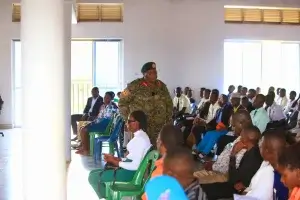Col. Emmy Katabazi, the Deputy Director General of the Internal Security Organisation (ISO), has highlighted the pressing need for educational reform in Africa, emphasising the urgency of liberating the minds of young leaders from the shackles of colonial education.
He made these remarks on July 20, 2024, while addressing a student leadership conference organised by the Uganda National Students’ Association (UNSA) at Lion of Judah High School in Kayunga District, where he was invited as the chief guest. The conference attracted over 300 student leaders from over 20 secondary schools in Kayunga District.
Col. Katabazi accentuated the paradox where highly educated individuals, such as professors, demand more in terms of allowances and benefits, often leading to strikes and grievances. This phenomenon raises questions about the true purpose and impact of education in the region.
“The more educated you are in Africa, the more you want to be served. You want more allowances, vehicles, and a soft life just because fellow Africans think you are knowledgeable. That is why we get professors going on strike. How can the owners of knowledge go on strike and start telling the president that they have nothing to eat? They are the same professors that teach entrepreneurship but don’t own even a kiosk,” Col. Katabazi said.

One striking example cited by Col. Katabazi is the discrepancy between what is taught in schools and the historical realities of Uganda. He pointed out that even today, students are still being taught that notable features like the Nile were discovered by white explorers, perpetuating a narrative that undermines the knowledge and contributions of local communities.
“Up to this day, we are still teaching pupils that it was only the white explorers who discovered the River Nile, Mt. Rwenzori, and other notable features as if the local people had never seen those features before. They tell you that John Speke discovered the source of the Nile as if the locals around the river were blind,” said Col. Katabazi.
Speaking from his experience in the formation of UNSA in the 1980s, Col. Katabazi emphasised the urgent need for a shift in mindset and educational practices. He stressed that education should not be for further enslavement but a tool for national liberation, empowering learners to think critically, embrace innovation, and take control of their destinies.
“When we were forming UNSA in the 1980s, we were talking of a struggle to change our education system to an education for national liberation, not enslavement,” Col. Katabazi added.
At the core of Col. Katabazi’s message is the call for practical education that liberates the minds of students from the constraints of colonial legacies. By advocating for meaningful change in the education system, he hopes to pave the way for a future where young Africans can harness their potential and shape a bright and self-determined path forward.

